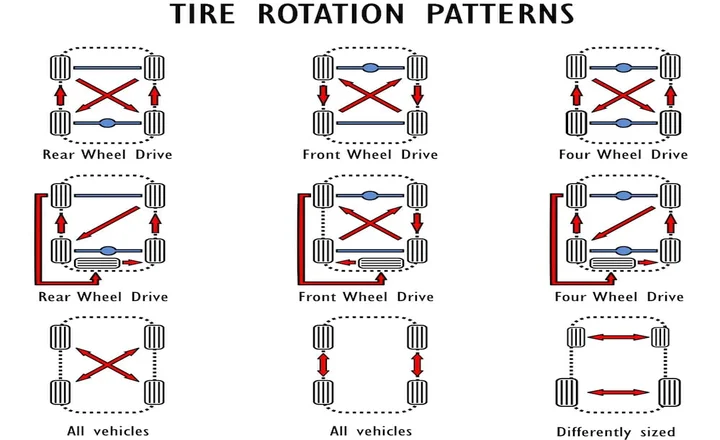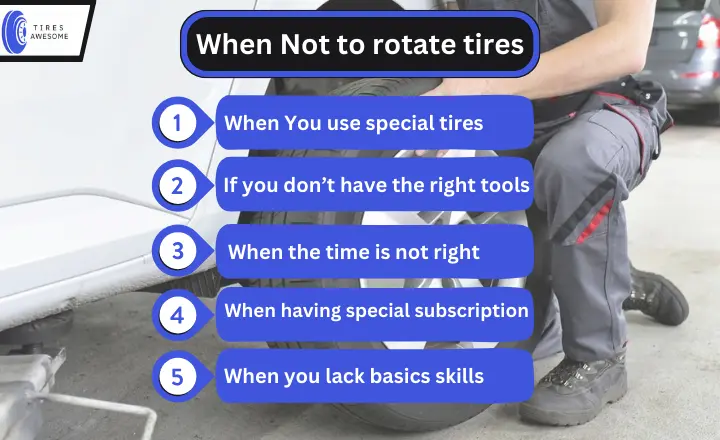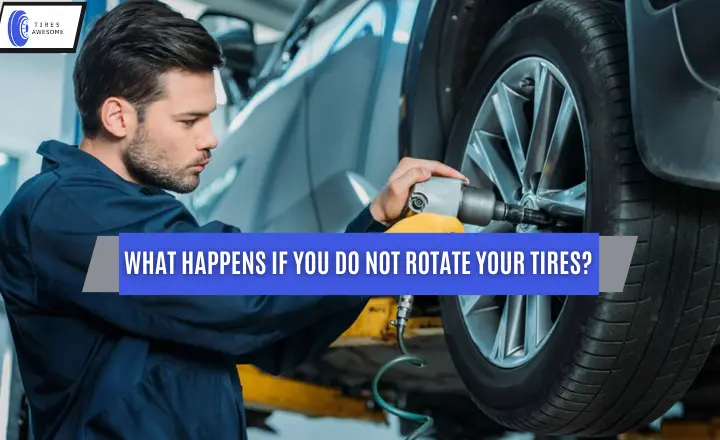Tire rotation is essential for distributing wear and tear evenly across all tires, but what happens if you do not rotate your tires? Tire rotation plays a crucial role in maximizing the lifespan and performance of your tires. When you fail to rotate your tires regularly, certain consequences can arise that may have an adverse impact on both your vehicle and your safety.
This article aims to educate readers about the negative outcomes that can arise from neglecting to rotate their tires as well as provide essential information on tire rotation.
What is tire rotation?
Tire rotation is an essential aspect of tire maintenance to ensure even wear and extend the lifespan of your tires. By periodically repositioning them, you can distribute the workload more evenly across all four tires. This helps compensate for variations in driving conditions and vehicle weight distribution.

There are several recommended patterns for tire rotation, depending on factors such as your drive type (front-wheel drive, rear-wheel drive, or all-wheel drive) and the type of tires you have (directional or non-directional). Take a closer look at some popular rotation patterns:
Benefits Of Tire Rotation
Tire rotation is a crucial aspect of regular car maintenance that offers several benefits.

Uniformity of Wear and Tear
By regularly swapping the positions of your tires, you can ensure uniform wear and tear. Front tires tend to wear out faster than rear ones due to their increased exposure to friction. This is primarily because the front tires bear the weight of the engine and are responsible for handling steering forces. The longevity of each tire improves, avoiding premature wear and enhancing overall performance.
Prevention of Blowouts and Other Safety Issues
A blowout, also known as a rapid loss of air pressure in an inflatable tire, can be a dangerous and unexpected event on the road. It occurs when the tire fails to maintain adequate air pressure due to various factors such as low tread depths, exposed metal parts, and damaged components. Tire rotation enables you to assess other important maintenance concerns.
Prevention of Tread Cupping
Tread cupping is a common tire issue that occurs when certain sections of the tread wear out more than others, resulting in an uneven pattern. The areas with increased contact with the road surface tend to wear down quicker than the rest of the tread. This can lead to pronounced dips and scallops on your tires, negatively impacting their overall performance.
Optimal Utilization of The Tires
Repositioning your tires is a simple yet effective way to optimize the lifespan of your tires and get the most out of their treads. By rotating your tires regularly, you can ensure even wear across all four wheels, which in turn allows you to enjoy more miles before needing to invest in new tires.
What Happens If You Do Not Rotate Your Tires?
Regular tire rotation is an essential maintenance practice to ensure optimal performance and extend the lifespan of your car’s tires. Failure to rotate your tires can lead to various problems.

Uneven Wear of The Tread
When you neglect to rotate your tires periodically, one of the consequences is that they will wear unevenly. It’s important to note that front tires tend to bear a heavier burden compared to rear ones due to the significant amount of friction involved in steering, speeding, and braking.
Shorter Lifespan
Failing to regularly rotate your tires can result in a significant loss of extra usage time and overall durability. Rotating your tires also ensures that you get better value for your money spent on purchasing them. When all four tires wear out at different rates, it necessitates replacing them individually rather than as a set.
Vibration and Noise
You may notice an increase in vibrations and noise while driving if you neglect to rotate your tires. These uneven tire treads can create a bumpy ride, resulting in a less comfortable driving experience for you and your passengers. To prevent these discomforts and potential complications, it is recommended to have your tires rotated regularly according to the manufacturer’s guidelines.
Decreased Fuel Economy
Unevenly worn-out tires, characterized by uneven tread patterns, can have a significant impact on your vehicle’s fuel efficiency, leading to increased fuel consumption. As these tires are not able to roll smoothly on the road surface, extra energy is required to keep them moving. This translates into higher fuel consumption and the need for more frequent trips to the gas station.
Poor Maneuverability
Failing to rotate your tires on a regular basis can have detrimental consequences for the overall handling of your vehicle. Neglecting this essential maintenance task may result in difficulties with steering. The uneven wear patterns that develop on untended tires may make it challenging for you to keep a steady course while driving.
Less Grip
Uneven tire wear is a common issue that can compromise your vehicle’s grip, which in turn poses potential dangers, particularly on wet roads. Your car’s tires might spin vigorously on the road without actually covering much ground.
During winter conditions, it is not uncommon to encounter issues such as spinning and repeated sliding. These difficulties often arise due to the lack of proper tire treads on your vehicle’s propelling tires.
How long does a tire rotation take?
The time it takes to rotate your tires can vary depending on whether you choose to do it yourself or take your car to an auto center. If you decide to do it yourself, you can expect the process to take anywhere from 30 minutes to an hour.

When going to an auto center, they possess specialized machines that can expedite the rotation process and get your tires properly positioned in no time. Opting for the DIY option means you will need to raise your car and manually reposition each tire individually.
How Often Should I Rotate Tires?
One common general recommendation is to have your tires rotated every 5000–7000 miles. It is also advisable to consider rotating your tires every six months or during an oil change. It is important to note that tire manufacturers often provide specific recommendations regarding how frequently you should reposition your tires.
When Not To Rotate Tires
There are certain circumstances when rotating them may not be recommended or necessary. These include the following:

When You Use Special Tires
It is essential to note that there is a wide range of special tire options, including winter tires, trailer tires, temporary spare tires, and all-terrain vehicle (ATV) or utility-terrain vehicle (UTV) tires.
It is crucial to follow distinct guidelines when rotating these specialized treads in order to retain their intended performance. Unless you possess the requisite expertise, refrain from attempting tire rotation on these particular types. It is unnecessary to include non-long-term use variants (such as irregular spare tires) in the rotation process
If You Don’t Have The Right Tools
To lift the car one tire at a time, you can utilize a car jack. This method can be tiresome and time-consuming. It is important to note that attempting to suspend the car in the air using four separate car jacks simultaneously is not recommended unless you have access to a professional lift.
It is unsafe to suspend the car using logs of wood or large stones, as these stones cause damage due to their hard surfaces. If you lack the appropriate tools, it is advisable not to proceed with rotating the tires.
When The time Is Not Right
Tire rotation is an important aspect of tire maintenance that ensures even wear and extends the overall lifespan of your tires. It is recommended to have your tires rotated every six months or after every 5,000 miles. If you have not used your tires extensively and they have not accumulated more than 5,000 miles since the last rotation, repositioning them may be unnecessary at this point.
Special Subscriptions
When you subscribe to the services of an auto shop, some establishments provide additional benefits, such as tire rotation. This convenient service eliminates the need for you to personally reposition your tires. At an auto shop that provides this bonus service, you can save time and effort by leaving the task of tire rotation in capable hands.
When You Lack The Basic Skills
If you are unfamiliar with the process of jacking up a car or removing and replacing a tire, it is crucial to avoid attempting to rotate your own tires. Tire rotation involves lifting the vehicle off the ground using a jack and properly securing it to ensure stability and safety. By switching the position of the tires wrongly, you expose yourself to potential risks.
You can also find Nitto Trail Grappler vs Ridge Grappler vs Terra Grappler | Which Is Best? in this post.
Conclusion
Neglecting to rotate your tires can harm your vehicle’s overall performance and lifespan. Uneven tread wear may lead to decreased traction, compromised handling, and increased stopping distances. It can result in premature tire replacement, costing you time and money. Hope you understand what happens if you do not rotate your tires. Don’t let negligence compromise your safety and wallet; prioritize tire rotation in your regular maintenance routine.
FAQs
Why does BMW not rotate tires?
Tire rotation is performed to enhance the lifespan of your tires. In the case of BMWs, the rear camber is adjusted in a way that causes the inner edge to wear more rapidly than the outer edge. If you have a square setup (which seems to be the case), rotating your tires won’t cause any harm.
Can you rotate tires without alignment?
An alignment is not always required when changing tires for a car, but it might be necessary if there are signs of tire wear. If the tires are evenly worn without any abnormalities, an alignment may not be needed. If there are signs of feathering, scuffing, or uneven tread wear, it indicates poor alignment.
How many kilometers are needed for tire rotation?
It is generally advised by most manufacturers to rotate your tires every 8,000 to 10,000 kilometers. You can refer to your owner’s manual for specific recommendations on the frequency of tire rotation. It is important to visit a trustworthy tire service center or garage.

